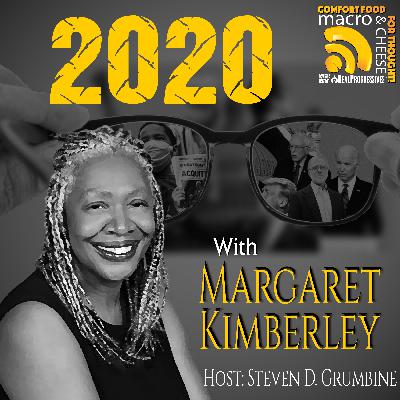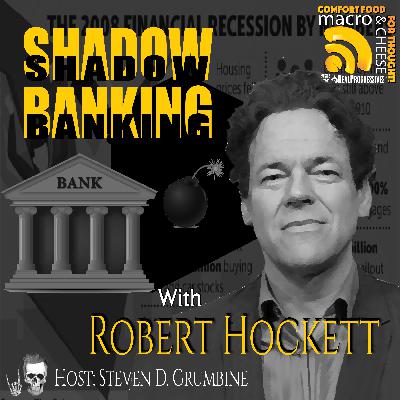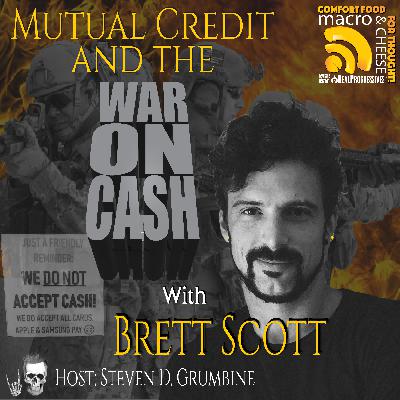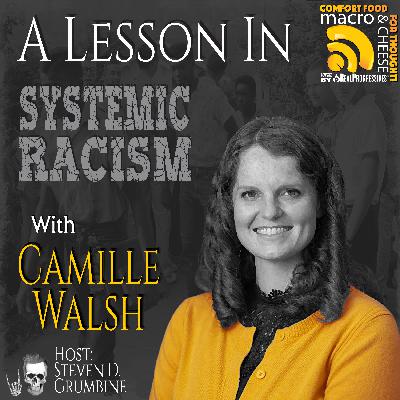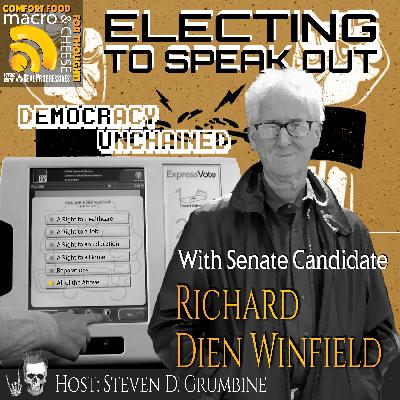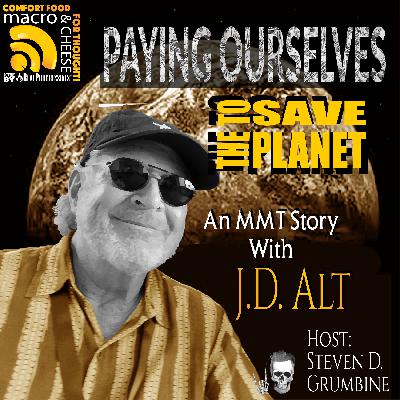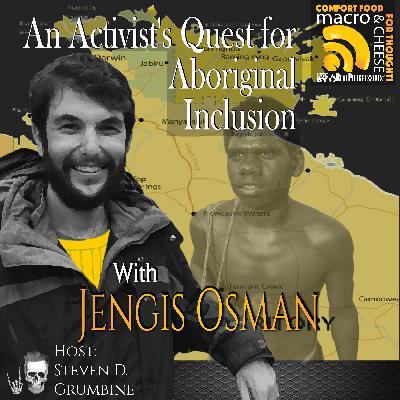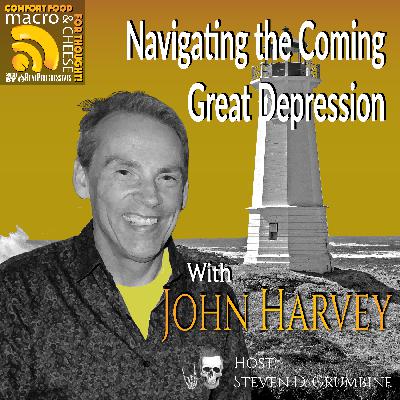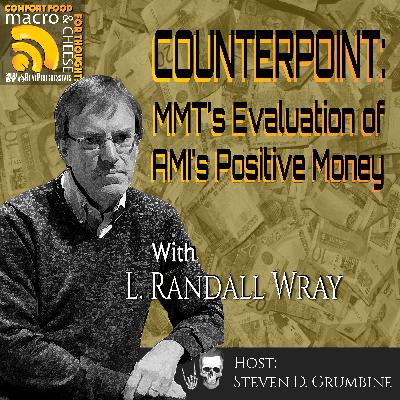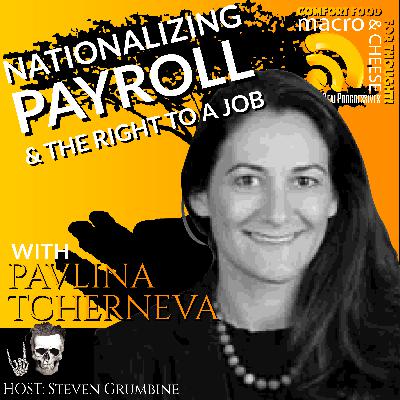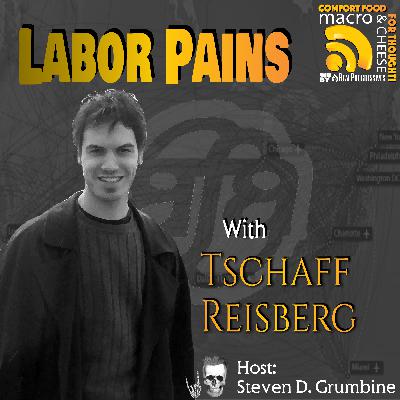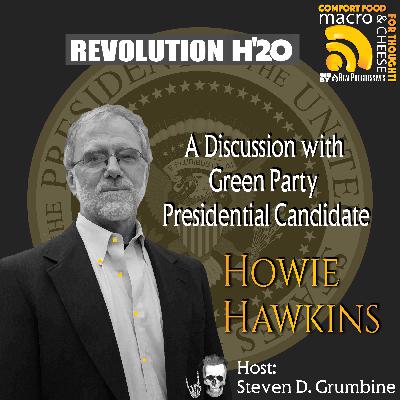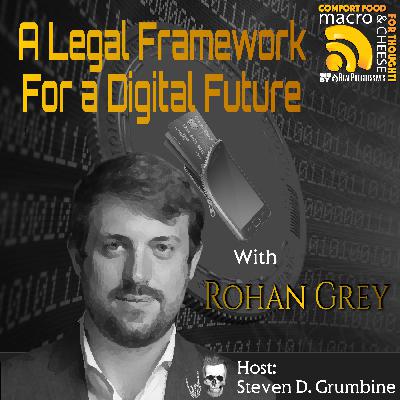Discover Comments on: Macro N Cheese Podcast
Comments on: Macro N Cheese Podcast

86 Episodes
Reverse
We here at Macro N Cheese are immersed in the world of MMT, but that doesn’t mean we don’t appreciate people who aren’t yet on board. As long as they’re not pushing an austerity agenda, we welcome them. Today’s guest, Margaret Kimberley, of Black Agenda Report, is just such an ally. Her book, Prejudential: Black America and the Presidents, was published earlier this year. This interview takes place as one region of the US is ablaze in wildfires and the pandemic is no closer to being resolved. Margaret sees the inadequate handling of COVID19 as confirmation that we live in a failed state. Countries that have responded best to the virus are either fully socialist or have robust public funding of their healthcare system. The climate crisis is further proof that capitalism is in crisis and neither of our two major political parties has plans to protect us from the fallout. Barack Obama illustrates the hypocrisy as he tweets dramatic images of the orange fire-lit skies and urges people to “vote like your life depends on it.” During his term as president, he bragged about increasing oil production and fracking. The Governor of California, another Democrat, has given more fracking permits this year than he did in 2019. The point is, we have these two parties who come together more often than not. Margaret reminds us that Democrats used to go through the motions of being the working people's party, and have been living off this reputation for decades. Yet when Kamala Harris was announced as Biden’s running mate, the headlines announced: "Wall Street Breathes a Sigh of Relief." "Silicon Valley is Happy." It’s impossible to have a conversation nowadays without debating the current presidential elections. Steve brings up his fear that a Biden win will cause Democrats to relax and go to brunch. Any energy built up in the resistance to Trump will die out. He asks whether she sees more possibilities for revolutionary change arising from a Biden or Trump victory. Margaret, who votes Green, believes they’re about equal, but doesn’t want to focus on electoral politics. Our job is to build the movement, taking a lesson from the civil rights era: During those years, people made concrete demands and they stuck with them. And they knew that they had an adversarial relationship with politicians and they didn't care. They knew that when they demanded the right to vote, or an end to segregation, or an end to housing discrimination, they knew that politicians didn't want to do what they were demanding. But they demanded it anyway. They worked cohesively en masse for years. And that is how those changes came about. I think the problem with electoral politics is that it should be what comes last. It's the movement that has to come first to create the political crisis, to move politicians, because that is the only way they move. That's true not only of civil rights legislation, it's true of the environment. Nixon gave us the EPA, the Environmental Protection Agency. Why he gave it is because people were in the streets, there were millions of people. Steve and Margaret talk about the differences and similarities between Malcolm X and Martin Luther King, Jr. By the end of King’s life he had broken with Lyndon Johnson, who was seen as an ally of the civil rights movement. This could be a model for working with elected officials; you don’t have to sell out your principles. The interview goes over many of the crucial issues affecting our lives in 2020, from Bernie Sanders to the actions of the Democratic Party elite; from Black Lives Matter to Antifa; from the Green Party to the need to end the duopoly. Margaret Kimberley is a co-founder and Editor and Senior Columnist for Black Agenda Report. Her first book, “Prejudential: Black America and the Presidents” was published in February. @freedomrideblog on Twitter http://steerforth.com/titles/prejudential/ https://bookshop.org/books/prejudential-black-america-and-the-presidents/9781586422486
Back in 2018, Steve invited Robert Hockett to come on to talk about shadow banking and explain its role in the 2008 financial crisis. We’re bringing back this interview because shadow banks are still around and people still have a hard time grasping exactly what they do. This is partly because many don’t understand what banks themselves actually do. The popular vision is that banks borrow and lend and that they make loans based on what they have in the vault; we MMTers know that they make loans based on profitability. Banks are policed with a view to their liquidity risk, while shadow banks are behaving the same way, without the policing. In order for us to unpack this issue, we need to know the meaning of “endogenous” and “exogenous” money. Bob defines endogenous as the credit-money generated by private banks and lending institutions, while exogenous is the sovereign element, created by the Fed or central bank. As in most cases, there’s always an element of public involvement in the private. This is usually overlooked. To better illustrate this, Bob uses the metaphor of franchising, where the Fed is the franchisor and the private financial institutions are the franchisees, charged with distributing a public resource which Bob defines as “the sovereign’s monetized full faith and credit.” When the Fed recognizes a bank loan or loan extended by a financial institution, it is effectively turning a private liability into a public liability. But if it's not fully cognizant that it's meant to be exercising quality control, you can get a defective product. That certainly happened in the lead up to 2008. In this interview, Bob points out that everyone operates under the false premise that there’s a shortage of capital. He also distinguishes between capital meant for productive use and that meant for speculation and gambling. The market for speculation - ie, the neverending quest for new ways to generate profit - leads to the creation of new and twisted kinds of financial instruments, such as the disastrous subprime mortgage packaging that led up the financial crisis. Bob’s proposal to insulate us, the public, from the kind of harm that arises from speculative mania is to separate the two kinds of financial institutions. Those that actually extend primary credit to homebuyers, small businesses, producers of goods and services should be separated from those that create credit for speculation. In other words, one institution would not be able to perform both functions. For a true solution, he suggests we look to the past, to the Reconstruction Finance Corporation of the 1930s and ‘40s: The RFC in its day was by far the largest financial institution in the entire world. Its balance sheet dwarfed all of the combined balance sheets of the Wall Street institutions. It was by far the largest credit-generating institution, credit-extending institution in the world, and it extended loans as small as $20 or $30 to African American barbershops in certain Los Angeles neighborhoods to giant mega-million or even billion-dollar loans for large public infrastructure projects like the Hoover dam or what have you. And this institution was a public institution. It was a government institution. After all, it’s our credit anyway, isn’t it? Robert Hockett is the Edward Cornell Professor of Law at Cornell Law School, Visiting Professor of Finance at Georgetown University’s McDonough School of Business, and Senior Counsel at Westwood Capital, LLC. He specializes in the law, economics, and philosophy of money, finance, and enterprise organization in their theoretical and practical, their positive and normative, and their local, national, and transnational dimensions. @rch371 on Twitter
Our guest this week is long-time friend of the podcast, Fadhel Kaboub. The Macro N Cheese audience will remember when Fadhel and Ndongo Samba Sylla visited with us last October on their way to the conference on African Monetary and Economic Sovereignty in Tunis, Tunisia. In that episode, we learned about the CFA franc, a vestige of colonialism, a symbol of the lack of true sovereignty in the post-colonial world, and a tool of economic oppression by international financial powers. The conference in Tunis was an unqualified success and plans for a second one were underway until COVID19 interfered. To keep the conversation alive, Fadhel and his colleagues from Senegal, Tunisia, and Germany wrote An Open Letter on African Economic and Monetary Sovereignty. Having it translated into 50 languages and creating audio recordings in each, makes it accessible at the grassroots level. There are more than 500 signatures of scholars, economists, activists, and political figures from developing and former colonial nations. (See link below) Ironically the pandemic turned a spotlight on the systemic problems of most countries, including those of the developed world. Hardest hit are the former colonies, especially those on the African continent, who are adversely affected by the extractive nature of the global supply chain. Fadhel uses the MMT lens to explain the interconnectedness of the lack of monetary sovereignty, lack of food and energy independence, and lack of political power. In building a coherent economic development alternative for the developing world, we need to understand how the interests of the IMF and World Bank, in conjunction with those of private importers, trap poorer nations in external debt and prevent the development of a strong national economy. There’s an illusion that richer countries send money to poorer countries when in actuality the US (and others) extract more wealth than they inject; it’s a recurring global pyramid scheme. Fadhel lays out the myriad ways this is accomplished and looks at the kind of investments, both financial and resource-based, required for achieving sovereignty and reliable growth. In the second part of the interview, Steve and Fadhel talk about the Green New Deal. Too often the discussion of combating climate change focuses on plans and obligations of the developed world. When we ask what it would mean to look at it from the point of view of the poorer nations, it’s clear that we need to consider a global reparations agenda. Fadhel says: I use reparations in the broadest sense of the term. That includes reparations for slavery, reparations for colonialism, reparations for post-colonial abuse, reparations for climate debt. And reparations are not one country to another alone; it's also within countries because countries have abused their own native people and have abused their own environment... So we're talking about a global reparations model that goes beyond the United States. To read the Open Letter on African Economic and Monetary Sovereignty, visit the website: mes-africa.org/ @Mon_Sovereignty on Twitter If you’d like to hear more from Fadhel, with Q&A, you’re invited to attend the Real Progressives National Outreach Call. September 16, 2020, at 9pm EDT/6pm PDT. Register here: https://www.bigmarker.com/real-progressives2/September-National-Outreach-Call-w-Dr-Fadhel-Kaboub Dr. Fadhel Kaboub is an Associate Professor of Economics at Denison University and President of the Global Institute for Sustainable Prosperity. global-isp.org @FadhelKaboub and @GISP_Tweets on Twitter
This week Brett Scott brings us a report from the war zone. He’s based in the UK but the war on cash serves the same global interests and employs the same sort of weapons in the US. The interview begins with Steve asking about COVID19 as perhaps a stealth weapon. Brett tells of the huge British supermarkets, at the start of the pandemic, blasting the message that cash is dangerous; warning that passing cash from hand to hand is likely to carry the virus along with it. Infectious disease specialists as well as major financial institutions have published evidence to the contrary. They say, in fact, that credit cards and pin pads are far more likely to transmit the coronavirus. But the message persists: cash is dirty. The mainstream narrative has it that the move to a digital economy is happening organically, from the bottom up. As if people are simply drifting away from cash and migrating towards digital payment systems. In reality the opposite is true. You could say the war on cash is a war on class, from the top down. Working-class and poor communities are highly suspicious of banks and digital finance. Once you have your dollars in your pocket, nobody has to know what you do with it, where you go, how you spend it… which is why the banks hate cash. Clearly then, the extension of that mainstream bottom-up narrative also deserves scrutiny. This is the part bemoaning the fact that certain marginalized communities have been left behind. (If only we could plug them into digital payment systems, everyone would be on the same level.) Cash is a public utility. Brett calls it a nonjudgmental form of money in this potentially dystopian brave new world. Without physical forms of money, you’re absorbed into a panopticon banking system which we have every reason to mistrust. It’s not just the finance sector that’s waging war against cash. Huge companies like Facebook need to sell ads. How can they prove to advertisers that the ads are effective if they don’t know what you’re buying? The need to know when you've bought the new appliance so they can stop flooding your pages with ads for them and begin pushing something else. Behemoths like Amazon and Uber profit from being automated and efficient. When big tech marries big finance, the aim is to seamlessly integrate on a huge scale. This is why they are able to annihilate small businesses and independent operators. The international aid community has usually handed out cash in disaster areas. Not only does it help the refugees, it typically gets spent into the local economy, boosting the community. Now these organizations are moving to digital transfers of funds via prepaid cards. Digital payments are designed for web commerce, not local development. Brett has spent the past 18 months working on a book that will be published late next year. We expect it to be full of the kind of insights about cash and class he has shared with us today. The book will also look at cryptocurrency (if you’re still unsure about bitcoin, this episode will set you straight). It will cover another area of Brett’s expertise: alternative monetary systems. For the remainder of the interview, Brett teaches Steve, and the rest of us by extension, about mutual credit systems and ripple credit systems. It’s rare that a guest talks about something that’s completely new to us. We found it exciting and we know our listeners will too. Brett Scott is a journalist, campaigner, former derivatives broker, and author of The Heretics Guide to Global Finance: Hacking the Future of Money. @suitpossom on Twitter Subscribe to his new newsletter: BrettScott.substack.com
Whenever Steve's guest is a lawyer, we know we're going to learn something new. Rohan Grey told us it's like the saying: “when you're a hammer, everything looks like a nail.” When you're a lawyer, you look at any issue and see a network of laws. This is why we're so grateful for the lawyers on Macro & Cheese - they teach us about that underlying legal framework. Camille Walsh isn't just a lawyer, she's a historian. We've been hearing about her book, Racial Taxation: Schools, Segregation, and Taxpayer Citizenship, 1869-1973, for a long time. Interestingly, she never intended to write about taxation, but her research led her there, and decided it for her. The notion of identifying as “taxpayer” is entwined with presumptions of entitlement which, in the US, date back to the founding principles, determining who has the right to be a citizen, who's qualified to vote, claim property, or own other human beings. The bottom line: it was a privileged group of white males back then and little has changed. Ultimately a group’s identity as taxpayers decides whether they’ll get some tiny amount of financial support, be it by federal, state, or local governments. After the Civil War, the taxpayers’ status was firmly established. All power was concentrated in their hands; they wrote all the laws and accrued all the benefits. It was during this period -- Reconstruction -- that there was a boom in the founding of schools. The fact that they were funded by local property taxes determined something as basic as whether a school was a one-room shack or a schoolhouse supplied with books. To this day, we have a stark disparity in resource distribution between schools in white and minority districts, with white men predominantly staffing the school boards and unevenly allocating funding based on this false sense of entitlement. The burden of educational funding remains squarely on the shoulders of revenue-constrained states and communities, creating a sense of scarcity and subsequent resentment toward nonwhites as “others,” allowing racist and classist biases to guide the outcome. Underfunded schools lead to under-educated citizens -- poor whites as well as minorities -- relegating them to low-income employment in a vicious cycle that traces back to the rigged educational system. Camille talks to Steve about the shocking number of rights that are assumed to be in the Constitution but aren’t actually spelled out until there’s a legal challenge, in which case the court’s ruling sets them in stone -- for better or worse. For example, the right to interstate travel didn’t exist until California attempted to limit settlers from other states. People assumed that Brown v Board of Education settled the issue of an equal right to education. In the 1954 ruling, Earl Warren said “education is possibly the most important function of state and local governments." What many of us weren’t aware of, though, was the 1973 decision in San Antonio v Rodriguez. It’s a little known case -- one out of many that dealt with education and segregation. In a 5-4 decision, it shot down the right to equal funding of schools. Unequal funding means unequal education. The argument leaned heavily on anti-communism, warning that once we start funding schools equally, we’ll be on the slippery slope to becoming Stalin’s Russia or Mao’s China. Justice Powell, that great hero of neoliberals everywhere, wrote the majority decision. In this particular moment in time, as extraordinary and unprecedented things are intersecting and coalescing, we need to understand the consequences of our history. This episode gives us much to consider. Camille Walsh is an Associate Professor of Law, Economics, and Public Policy at the University of Washington Bothell. She doesn’t spend much time on social media. Racial Taxation: Schools, Segregation, and Taxpayer Citizenship, 1869-1973 https://bookshop.org/books/racial-taxation-schools-segregation-and-taxpayer-citizenship-1869-1973/9781469638942
World-renowned economics professor and accomplished author/podcaster/speaker Mark Blyth joins us this week to discuss MMT, the variants of capitalism, and the current culmination of the populist anger outlined in his new book Angrynomics, co-authored by Eric Lonergan. The book, in brief, is a revolutionary, yet practical solution for an economically unjust world brought into clear focus by the Covid19 pandemic. Mark has been a consistent ally to the progressive movement over the years, using his broad reach to advocate for economic literacy and justice. Although he hasn't fully embraced MMT as his lord and savior, he calls himself a fellow traveler with no doubt that when they round up the MMTers, he'll be thrown in the back of the van with them all. His sharp wit and finely honed sense of the absurd make his social and political observations as interesting as his economic ones. An underlying theme the authors encountered consistently throughout the research for Angrynomics was - you guessed it - anger. It arises from the disconnect between our experience of the world and how it's explained to us. About anger, Mark says, “you assume you know what it is, but don’t necessarily think about it.” He talks about public and private anger, distinguishing righteous anger from tribal anger which is, inevitably, weaponized. The economic portion of the discussion touches on the variants of capitalism throughout our history, and the benefits or drawbacks of each. He also focuses on how, when the government spends at the bottom through wages and public purpose spending, the wealth trickles up, but when spent at the top, it most certainly does NOT trickle down. There’s no lack of good ideas and policy prescriptions; there’s a lack of political courage to implement them. Mark and Steve look at the social and political differences between “boomers” and the generations that came after. Mark attributes it to their incomes. The boomers’ income is asset-based, making it stable and secure, while the others rely on income drawn from wages, uncertain and insecure. These younger and poorer Americans are expected to be the shock absorbers of a volatile and unpredictable economy. The current pandemic is revealing the gaping flaws in our economy and waking up many normally comfortable and apathetic folks to the reality millions of Americans have been living every day -- being left behind by an economy built by, for, and of the oligarchs. It’s capitalism… and the people are angry. We cannot nudge the system back to stability. We need radical economic reform to create a bottom-up economy now. Mark Blyth is Professor of International Political Economy in the Department of Political Science at Brown University and a Faculty Fellow at Brown's Watson Institute for International Studies. He is co-author, with Eric Lonergan, of Angrynomics, and author of Austerity: The History of a Dangerous Idea. Check out his podcast https://watson.brown.edu/rhodes/podcasts, including a recent interview with Stephanie Kelton http://markblyth.com/ @MkBlyth on Twitter https://www.goodreads.com/book/show/48908670-angrynomics
The Covid19 pandemic is much more than a public health catastrophe; it has highlighted and exacerbated economic, social, and environmental crises on an unprecedented scale. While Congress sits on their hands, a learning-by-doing experiment is already underway at the Federal Reserve. With more than 40 million Americans out of work, the Fed appears ready to fulfill its congressional mandate to both maximize employment and promote stable prices. Indeed, the strongest signal that this time things can be different is the opening of the Fed’s new Municipal Liquidity Facility (MLF), which promises to buy both existing and future state and municipal debt. -- from “Overcoming Covid19 Requires Rethinking University Finance” (see article link below) Our guests, Ben Wilson and Scott Ferguson, are working with others in the MMT community to develop the plan for a new university-issued currency, the Uni, with backing by the Federal Reserve. Universities are not unlike small states or municipalities. They provide jobs and living quarters, engage in commerce both on- and off-campus. They collect rent on their vast real estate holdings. They also behave like banks, providing students with accounts for purchasing books and supplies. The university’s stated mission is to contribute to the greater good, produce educated citizens, and be cooperative partners with the surrounding communities. According to our guests, the Uni’s value extends beyond immediate financial practicalities. The project can use the university as a proxy for reformulating the macro economy on a micro-scale, creating real-world experience pushing the modern money agenda forward. We can ask ourselves what we want money to do for us and how it can meet the needs of our communities. Rather than wait for the federal government to act, we can structure it on our own terms. Benjamin C. Wilson is an Associate Professor of Economics at the State University of New York at Cortland and a research scholar at the Global Institute for Sustainable Prosperity. @autogestion77 on Twitter Scott Ferguson is an Associate Professor of Film & Media Studies in the Department of Humanities & Cultural Studies at the University of South Florida and a Research Scholar at the Global Institute for Sustainable Prosperity. He is co-host of Money on the Left podcast featured by Monthly Review Online. @videotroph on Twitter https://www.boundary2.org/2020/07/scott-ferguson-benjamin-wilson-william-saas-maxximilian-seijo-overcoming-covid-19-requires-rethinking-university-finance/ Read about the Uni in the demands issued by the Resident Assistant/Peer Mentor union at UMass Amherst. https://docs.google.com/document/d/1psWUI4PGVVYOJ9flQiwsWKWHK9qhdLPFjonToNo4R7M/mobilebasic?fbclid=IwAR2pKwOHzggugNSJsrrQGFtm1Bl7D-1eYJDfQNgzD4s5yIfnu2VgmkJCTkc The Global Institute for Sustainable Prosperity http://www.global-isp.org/
This week we welcome Richard Dien Winfield, a rare candidate for national office who is running on the Federal Job Guarantee and Medicare for All. It’s no surprise, then, that Richard is fully onboard with Modern Monetary Theory and spoke at the MMT Conference in Stonybrook last September. Steve talks with him about his new book, Democracy Unchained: How We Should Fulfill Our Social Rights and Save Self-Government, and the platform for his current campaign. Richard is running in Georgia’s special election for the US Senate. His campaign is founded on correcting the failure to recognize and enforce our social rights, which he sees as the key to remedy blockages of opportunity that hobble our democracy. Throughout this interview, he frequently returns to the concept of social rights as the rights that are not in our constitution but should be. These include the right to a decent livelihood, healthcare, education at all levels, the right to balance work and family, and to level the playing field between employer and employee. Martin Luther King said that without a job and income, one can have neither life, liberty, nor the opportunity to pursue happiness. Richard eloquently connects the dots between our social rights, demonstrating their interdependence. How can you solve homelessness without a job guarantee, which will require a higher minimum wage than the $15-an-hour we normally hear about. The job guarantee would, of course, include full benefits of pension and healthcare -- though we wouldn’t need the latter if we had Medicare for All, which is another necessary social right: without health, we can’t exercise our freedoms. There are two exacerbating factors disempowering employees. The first is globalization and free trade, due to the ease with which companies can find the lowest wages and relocate. The second factor is the rise of the gig economy. Employers can use technological advancements so that workers are on their own and scattered around the globe; the employer doesn’t have to provide overhead or face worker solidarity. Richard describes the UBI as setting up a 2-tiered society: those condemned to the poverty income of the UBI alone, and those who receive the UBI plus wages from their jobs. Instead of eliminating economic disadvantage, it sanctions it. Considering the threat of fascism, we look again to an FJG. For all the praise given to the social democracies of northern Europe, the fact that they don't have a job guarantee has left them vulnerable to the kind of xenophobia and bigotry that has caused workers in other countries to vote for extreme right-wingers. When there aren't enough jobs, a wave of immigrants is seen as a threat. Universal healthcare and generous unemployment insurance do not replace the need for jobs. Richard and Steve go through all the social rights in depth and, sometimes, from a new angle. Listeners will hear something they might not have considered about racism, sexual harassment, unionization, corporate compensation, reparations, the needs of families, and much more. Have you ever heard a candidate demanding legal care for all? Listen to the episode! Richard Dien Winfield is an American philosopher and Distinguished Research Professor of Philosophy at the University of Georgia. He has supported striking workers, organized sugarcane laborers, and joined unionizing efforts at UGA. Winfield was a candidate for U.S. Representative from Georgia's 10th Congressional District in 2018 and has declared his candidacy for the 2020 United States Senate special election in Georgia. WinfieldforSenate.com @WinfieldForUS on Twitter https://bookshop.org/books/democracy-unchained-how-we-should-fulfill-our-social-rights-and-save-self-government/9781950794133 Find his books on Amazon https://www.amazon.com/Richard-Dien-Winfield/e/B001HP3FH2?ref_=dbs_p_pbk_r00_abau_000000
J.D. ALT is an architect who has spent much of his career researching, inventing, and visualizing things that he hoped might improve the quality-of-life and prosperity of collective society. Gradually, he came to two realizations: first, the kinds of things he was envisioning (free-to-ride downtown people-movers and affordable housing strategies) would never be undertaken by a profit-oriented corporate business model and, second, the only other possible financier--the federal government--was "broke" and hopelessly in debt. Alarmed and discouraged by these realizations, he stopped thinking about new things to build and started investigating how--and why--it could possibly be true that collective society was, "for lack of money," so helplessly unable to build things it both needed and could dramatically benefit from. So begins J.D. Alt’s biography on Amazon. This week he joins Steve to talk about his new book, Paying Ourselves to Save the Planet: A Layman's Explanation of Modern Monetary Theory. The interview begins with J.D. describing the insights he gained once he understood that fiat money actually refers to reserves and the other money we use, bank-created money and cash money, are claims on those reserves which are held in the reserve banking system and never leave. They are digital entries on a score sheet. One method for creating reserves is when banks make loans (creating bank-money). This is a claim on that bank’s reserves at the central bank and is how money for private enterprise is created. Since private corporations only engage in producing goods and services generating profits, it’s safe to say that bank-money is only created for profitable endeavors. Therefore, the myriad of things we need as a society that don't bring in a profit must be created by public enterprise. Where does the money for public enterprise come from? This leads to the heart of MMT, and J.D. breaks down the distinction between it and the standard theory of money. In his book, J.D. tallies up the public enterprise goods and services we require and puts together a projection of what they’ll cost. When compared to how much the standard money theory believes the government can either collect in taxes or borrow, it becomes clear that we must look at a different way to finance the public needs. Steve and J.D. discuss just a few examples of the cost of the climate crisis. Much of it involves paying people to mitigate and adapt to climate change, which includes the expense for farmers to sequester carbon in their soil and workers to build machines that scrub carbon out of the atmosphere. Ironically, the bottom line is instead of costing the people a lot of money, a lot of people will be getting paid. J.D. Alt is an architect who writes about the economy, the climate crisis, housing, and the needs of humanity. His books include Paying Ourselves to Save the Planet, The Millennials’ Money, The Architect Who Couldn’t Sing, Low Earth Orbit, and Housing for the Masses, Dwellings for the Soul. Find him and his books at JDAlt.com @JD_ALT on Twitter
A discussion of racial taxation and private digital currency may seem like two disparate subjects. Raúl Carrillo’s genius is his ability to explain these things in such a way that their intrinsic connections are unmistakable. Just as there is racialized taxation, we also have racialized surveillance, and private digital currency is definitely in the surveillance business. Previous episodes have spoken of the effects of racial taxation, creating a disparity in public schools due to the inequities in local property tax funding schemes that pay for education. The same kind of taxpayer pressures that have defunded the schools have combined with the starving of federal support for the states, making it hard for local governments to provision themselves. States and municipalities resort to collecting fines and fees through petty crime designation, using the courts and incarceration as a funding source. The burden falls heavily on poor and oppressed minorities. These problems come from neoliberalism’s core embrace of austerity. Mass unemployment results in near-mass incarceration. A theme running through Raúl’s scholarship and our collective activism is that if something is a right, or is integral to due process and constitutional safeguards, then it should be funded by the federal government. Otherwise, what does it mean to have fundamental rights in this country? The government is willing to spend unquantifiable sums defending the rights of property while insisting it’s too expensive to provide jobs, healthcare, and housing. When the government doesn’t meet the people’s needs, it creates a vacuum that forces them into debt, turning to the predatory lenders who have built an industry on the backs of the needy. And now Wall Street is increasingly serving fewer kinds of investors. When Wall Street decides it’s no longer profitable to prey on the poor, Silicon Valley is offering an alternative that is predatory in its own way. Raúl recently produced a Black Paper on Libra, Facebook’s foray into the digital currency market. Most cryptocurrency doesn’t have retail value, so much of the activity is through speculation. Libra is an attempt to create a stabilized private money, which introduces a new set of dangers. Steve and Raúl devote a good portion of the interview looking at the different levels of threats that are posed by turning over the reins of currency creation to tech corporations. Libra is connected to Facebook and Uber, but Google and Amazon can’t be far behind with their own projects. Silicon Valley is now in the debt game. With public money, we can still demand some degree of protection for our privacy rights. Facebook’s entire business model is based on surveillance; it knows what you’ve bought, where you’ve been, what you like, and who you hang out with. Police have been using Facebook’s facial recognition to identify Black Lives Matter protesters. It’s hard to imagine enforcing legal protections when Facebook has been breaking promises to (defanged) regulators for years. For the US, public-private partnerships have crowded out government spending on social needs. For us MMTers, using the public purse for the public purpose is of seminal importance. A private currency, spying on us all, cannot be tolerated. We need to multi-task - wed the anti-racist, decarceration, and abolitionist fights with a vision of public money spent in a way that allows people to flourish. Raúl Carrillo is the Board Chair of the Modern Money Network and a Research Scholar at the Global Institute for Sustainable Prosperity. He sits on the boards of the National Jobs for all Network and the Our Money campaign. @RaulACarrillo on Twitter Reflections: Challenging Monetary Sanctions in the Era of Racial Taxation https://escholarship.org/uc/item/7rp8g89c Banking on Surveillance: The Libra Black Paper: https://ourfinancialsecurity.org/wp-content/uploads/2020/06/Libra-Black-Paper-FINAL-2.pdf?fbclid=IwAR1qqjecm45wHuNUljezfm19qCLg034VqgL2rQAwjqsr__B_Zfulzt0OKLs
Our guest is Jengis Osman, an activist and labor organizer who was led to Modern Monetary Theory through his life experiences and those of his family and the people he works with. After graduating from university, he struggled to find work and questioned why it had been easier for his grandparents who had immigrated to Australia from wartorn Cyprus in the 1970s. When he taught English to new immigrants, they asked the same question: why aren’t there enough jobs? Jengis now lives in the Northern Territory, a remote section of Australia. The effects of austerity are always harshest on the most vulnerable groups, but the living conditions of Australia’s indigenous population also reflect that country’s unique history of brutal colonial oppression. Before colonization the people had an abundance of food and water; their kinship systems worked for them. The colonizers tore communities apart with forced relocation to different regions with different customs and a foreign language. Children were uprooted and sent to mission schools far from their families. Colonialism effectively made slaves of the indigenous people and austerity assured their continued suffering. When Jengis discovered Bill Mitchell’s blog (http://bilbo.economicoutlook.net/blog/), the pieces began falling into place. Much of this interview takes us through the MMT fundamentals that brought reality into focus for so many of us, starting with the difference between a currency creator and a currency user. Jengis talks about Pavlina Tcherneva’s example of the “hut tax” imposed by the British in Malawi as a coercive measure that provided the colonists with a labor force by creating a need for the pound sterling. Understanding that taxes don’t fund government expenditures at the national level leads to awareness of the vast array of unnecessary political choices that cause pain at every level, including unemployment and homelessness. Fracking in the Northern Territory will damage the water supply and prolongs the negative impact of fossil fuels. Yet when the central government doesn’t spend enough in the territories and states, regional governments are forced to find private investors whose interests don’t align with that of the community. This brings us back to the difference between a currency creator and a currency user. Steve often asks our podcast guests how they introduce MMT to the uninitiated. Jengis talks about money as akin to points on a scoreboard -- the referee cannot run out of them. Money is a measure, like an inch or a mile. Those numbers are a statistical artifact and without a context, they make no sense. The economy isn't an abstraction that sits above us and is not a “thing” we should be working to serve. The economy is us. We want to focus on achieving real outcomes, like employment opportunities, tackling climate change, and creating the kind of world we want to live in. Jengis Osman currently works as a union organizer. He has had many occupations over the years including a substantial time unemployed as neoliberalism has decimated the idea of secure employment, providing sufficient work for all and forced education and training onto the individual rather than a collective responsibility. These jobs include a terrible stint in the retail sector, a call center as a researcher, a garbage man, and an ELICOS teacher. Check out his blog: https://jengis.org/ @JengisO on Twitter
This week we welcome back our favorite Cowboy Economist, who immediately tells us what a great job Real Progressives and Macro & Cheese are doing. Smart guy! John Harvey and Steve have much to discuss. The coronavirus pandemic is showing no signs of abating. It underscores or exacerbates all the other monumental problems we’re facing. There’s the high stakes presidential election asking us to choose between a deficit hawk neoliberal and a lunatic, while a large portion of the public have no faith that the electoral process is anything but rigged, especially after the primaries. Police brutality and injustice have reached critical mass, sending people into the streets in numbers we haven’t seen in our lifetimes. The climate crisis is being ignored, but the IPCC predictions hang over us like a doomsday clock, ticking away. Steve and John share the frustration of everyone who understands MMT: we know things don’t have to be this way. John holds the current economics discipline in particular disdain. Politicians turn to mainstream economists for advice, but the leading lights in the field believe that the market fixes itself. Paul Krugman might concede that we can “help it along,” but there are few other fundamental differences between the liberals and conservatives in the profession. Given that we’re staring down the barrel of a worldwide depression, Steve asks what we can learn from the Wall Street crash of 1929. John gives a concise history lesson, beginning with the enormous economic expansion that took place in the 1920s when, for the first time, there were as many people living in cities as on the farms. It was a time of huge investments on the part of government, businesses, and individuals. The federal response is where we see the difference between the depression of then and now. Today both parties confuse the economy with the market system. The economy is the means by which we meet our needs for food, shelter, and clothes, among other things. We don’t need the free market system to do that. During the New Deal, they applied extra-market solutions. There wasn’t a food scarcity, nor is there in 2020. What people need is an income so they can purchase those necessities, pay the rent and bills. John says that policies of the New Deal addressed social problems, not market problems. There were urban and rural projects, like building city parks or the Tennessee Valley Authority, creating jobs while improving the quality of life for residents of the area. Compare the government’s solutions today. The COVID-19 crisis has created massive unemployment and business closures, The response by every state governor is to increase commerce - get the market running again. The federal government could have generated income for everyone. Instead, we’re going to emerge from this pandemic under a mountain of debt. This interview isn’t entirely limited to the discussion of economics -- it would be hard for John and Steve to stay away from politics for a full hour. Their exchange of ideas is interesting because neither of them insists that he has all the answers. (We need a strong third party in order to exact some leverage. Or should we expend energy on parties at all right now?) They appear to be considering and reconsidering their positions just as we all are. In our whiplash world, how could we trust anyone who claims otherwise? John T. Harvey has been a Professor of Economics at Texas Christian University. since 1987. He specializes in exchange rates, macroeconomics, business cycles, and contemporary economic schools of thought. Check out the Cowboy Economist on YouTube.. https://www.youtube.com/channel/UCL9PHjlPQ5wq0CD6vAibxYg/featured @John_T_Harvey on Twitter
An alternate title for this episode could be “Back to Basics.” It reminds us why Randall Wray’s MMT Primer continues to be a definitive resource for the Macro & Cheese community. This 2017 interview came about when the American Monetary Institute (AMI) published an article critiquing MMT. Randy Wray was mentioned and quoted throughout, so Steve invited him on to set the record straight — and maybe shed some light on AMI and its theory of “positive money.” If you don’t come away with a clear understanding of it, it’s because Randy himself can’t always get to the bottom of AMIs logic. It turns out they have some less than pristine methodology. It’s hard to assess the strength of their theory when you can’t pin down the theory. They don’t even produce balance sheets. AMI wants the Treasury to print greenbacks because they posit that the Federal Reserve is private and independent, with full control over the US dollar. Randy explains that we do, indeed, have a sovereign currency, and suggests that we read the Federal Reserve Act of 1913. The Fed is a creature of government, under the control of the Congress. Its very limited independence consists of the freedom to set overnight interest rate targets. It’s easier for Randy to debunk AMI’s critique of Modern Monetary Theory, and a large part of the interview takes us through the fundamentals of MMT — how money is created, the differing roles of the Treasury and the Fed, the causes of hyperinflation, sectoral balances, and why the US will always have a trade deficit. In our lifetimes, at least. We end with a long discussion of solutions to inequality. Since taxing the rich is politically unfeasible, Randy says a better way to reduce their wealth is to attack it at its source, where vast wealth is amassed. He wants to forbid corporations from buying back their stocks. Corporate CEOs and upper management receive outsized compensation in the form of stock options. Corporations spend more on stock buybacks than on investment in plants and equipment, which would create jobs. The buybacks raise the value of the shares, then the CEOs exercise their stock options for huge amounts of money. There’s no reason to allow it. This is an episode you’ll want to listen to right before trying to explain MMT to your uncle. Better yet, send him the link. L. Randall Wray is a Professor of Economics at Bard College and Senior Scholar at the Levy Economics Institute. http://www.levyinstitute.org/scholars/l-randall-wray https://neweconomicperspectives.org/modern-monetary-theory-primer.html Steve Grumbine says this article changed his life. Check it out: https://neweconomicperspectives.org/2014/05/taxes-mmt-approach.html
If any of our listeners aren’t following The Funky Academic on his website, YouTube, or Twitter, this episode will change all that. Macro n Cheese usually leans heavily towards economics, but Irami Osei-Frimpong arrives at many of the same conclusions that we do, yet gets there by a different route. That helps make this such an interesting interview. In these disturbing times, his strong sense of humor and irony are a welcome respite. Irami is a PhD student in philosophy, which he chose to study because, as an undergraduate, he realized that people are confused about what justice looks like. In a liberal democracy, there’s no need for a minister of propaganda; our thinking is controlled by what is omitted from our education. He says we must know what we’re fighting for because if we’re merely guided by emotions or compassion, we can be easily confused and swayed. “You need actual arguments to ground you so you're not buffeted about when your latest crush is a Republican.” This is how we end up accepting that there’s a “natural” rate of unemployment, for example. The episode is full of astute observations about racism, economic insecurity, and the indisputable necessity of a Federal Job Guarantee. Alton Sterling was selling CDs from the trunk of his car, and Eric Gardner sold loose cigarettes. Imagine if they had guaranteed jobs that paid a dignified wage, which Irami maintains should be $22 an hour. We don’t want a living wage because we want to do more than just live. Irami draws lessons from history as much as from today’s headlines and he often ponders the concept of citizenship. How can we participate in the political process while dealing with unemployment? In a nation of laws, how can we exercise our rights as citizens if we can’t afford legal protection? He tells an anecdote about Hulk Hogan which illustrates why we need a single-payer legal system as much as we need single-payer healthcare. Steve and Irami discuss the marijuana business, reparations for African-Americans, and unprovoked police shootings. While the interview is laced with humor, the themes and implications are dead serious. Irami Osei-Frimpong is a PhD student in Philosophy at the University of Georgia. Check out his website: funkyacademic.com @IramiOF on Twitter
The coronavirus epidemic has brought about an unprecedented level of unemployment and destitution in the US. Without significant structural change, it could affect people’s lives for decades to come. In this interview, Pavlina Tcherneva talks about the roots of the problem and lays out the kind of imaginative yet practical solutions that we need. Pavlina’s new book, The Case for a Job Guarantee, will be published later this month. It is a call to rethink the assumption that unemployment is unavoidable and that there’s little we can do about it. As a primer on the Job Guarantee, it documents all the benefits of the proposal. It confronts the narratives on competition, the market, and personal responsibility. The book exposes what Pavlina calls a major failure of her profession of economics. Economists have validated unemployment, structuring our thinking about the economy, markets, and their behavior, around the fallacious concept of a “natural rate of unemployment.” This validation brings massive failure at the theoretical, policy, and moral levels. At the time of this interview, ongoing demonstrations across the globe have been erupting -- spurred by the Black Lives Matter movement in the US -- expressing discontent with inequality in country after country. The spotlight on racial and economic inequality, compounded by the public health crisis, makes this an ideal time to look at the Job Guarantee. In addition to providing economic security for individuals, it centers on the creation of jobs that are geared to the needs of each community. This is a time to think long and hard about preparedness for future crises of all types, and environmental rehabilitation is long overdue. The Job Guarantee has a significant place in all of these plans. In the current economic paradigm, work that doesn’t generate profit is undervalued. Yet on a human level, these are the jobs that matter the most: education, health care, environmental protection, and care for the young or elderly are the true essentials of life. The interview is vibrant with the depth of understanding and empathy that we’ve come to expect from Pavlina. Our social, political, and economic problems are not intellectual problems to be played out on charts. Unemployment and underpaid jobs take a devastating toll on individuals, families, and communities. Nobody understands this as well as Pavlina. PAVLINA R. TCHERNEVA, Ph.D., is an Associate Professor of Economics at Bard College and a Research Scholar at the Levy Economics Institute, NY. She specializes in Modern Monetary Theory and public policy. Check out a recent op-ed crafted by a group of international female scholars. It’s been published in 26 languages. https://democratizingwork.org/ Book https://www.wiley.com/en-us/The+Case+for+a+Job+Guarantee-p-9781509542109 Website: https://www.pavlina-tcherneva.net/ Twitter: @ptcherneva
Tschaff Reisberg is not only an early proponent of MMT, but is also a union representative with extensive experience in real-world struggles between workers and employers. His story - and that of the flight attendants union - is instructional for anyone fighting for fundamental change. Prior to the COVID-19 pandemic, the airline industry was booming. Flight attendants’ jobs were secure, with expectations of growth and more hiring. When the virus hit, the entire industry shut down. They lost 95% of their passengers. Like many industries during the crisis, there were talks of bankruptcy and furloughs. Tschaff and Steve discuss the impact of the virus on the working class as a whole. When people lose their jobs, they stop spending; when they stop spending, others lose their jobs and it snowballs across the country, as we’ve seen in the record-breaking unemployment figures. In past financial crises, government bailouts served to enrich corporate CEOs and shareholders, while allowing the working class to suffer. Tschaff’s union was able to win unprecedented protections in the CARES Act, the Coronavirus Aid, Relief, and Economic Security Act. The airlines were awarded grants that came with stiff conditions: they can’t downsize or do stock buybacks, there are hard limits on executive compensation, and they can’t furlough the employees. Paychecks will be protected through September. Tschaff’s political and economic education included the realization that unions can’t just fight employers but need to work with the government as well. Corporate interests build connections with political officials and apply constant pressure to carry out their agenda. When the unions do likewise, they’re able to get a seat at the table. Organized labor has been weakened over the past half-century but has finally stopped declining. The more the unions flex their muscles the more popular they become. As MMTers, Tschaff and Steve understand the importance of fighting for a Job Guarantee. They talk about the myriad benefits which include protecting labor, stabilizing the economy, and preventing inflation. It also combats anti-immigrant sentiment; if your own job is secure, you have no reason to fear others. They talk about one aspect of organizing that isn’t always considered. The more engaged you become, you don’t just change others -- you yourself are changed because you interact with people you wouldn't ordinarily meet. Awareness of each others’ issues develops into overlapping and united interests. This is how we build a movement. Tschaff Reisberg has been in airlines for 12 years, having worked on the ramp, deicing, customer service, and IT. He’s a union delegate for the Association of Flight Attendants-CWA local 23089. He currently resides in Charlotte, NC, with his wife and 2-year-old daughter.
Howie Hawkins is the Green Party’s candidate in the US presidential race. He joins Steve to discuss not only his platform, but the role of third parties in US politics and, of course, economics. Steve opens the episode by pointing out that he and Howie are in about 90% agreement on all the issues. Howie was the first US candidate to campaign for a Green New Deal ten years ago, in 2010. He ran against Andrew Cuomo for Governor of NY state in 2010, 2014, and 2018. With the suspension of Bernie Sanders’ presidential campaign, progressives are confronted with the choice of “Dem-enter,” which nobody is excited about, and supporting a third party, which many think of as a wasted vote. Here Howie makes a good case: a strong third party can force the media and other candidates to deal with our demands and confront issues that they’d prefer to avoid. There are historical precedents: the Liberty Party put slavery on the ballot and the Socialist Party brought social insurance programs into the forefront, some of which were adopted in the New Deal. Howie’s gubernatorial run in NY put so much pressure on Cuomo that he was forced to adopt some Green Party positions including a ban on fracking, the $15 minimum wage, and paid family leave. One of Howie’s goals in this campaign is to receive a large enough percentage of the vote to get the Green Party on the ballot line during the next election cycle. This will make it easier for down-ballot Green candidates to run. To seriously compete for national power, it must be built from below. Steve and Howie discuss strategies for breaking through the media blackout, achieving rank-choice voting, and forcing third party candidates into the debates, which was easier to do when debates were sponsored by the League of Women Voters -- before the Commission on Presidential Debates muscled them out. The Commission is not a government agency; it’s a private nonprofit corporation controlled by Democrats and Republicans, so everyone has to play by its rules. The majority of the interview is about combating the climate crisis within the time limit we’re faced with. Steve brings up his recent interview with Steve Keen who says we will need a command economy. Howie counters that we need a democratically planned economy. We already have a command economy with giant corporations that are “private tyrannies.” The people don't have a say in whether we're doing more oil and gas drilling or investing in renewables. Howie proposes a socialist economic democracy which he says we will need in the key sectors if we're to make the rapid transition. It can’t be done with carbon taxes, some mandates, and a few incentives. The incumbent industries will always fight those and keep us tied up. We should take over the utilities and companies like Exxon Mobil and Koch Brothers Industries. Howie outlines a plan that includes maintaining a living wage for workers in that sector. The rest of the interview goes into the need for free or low-cost high-speed internet throughout the country, the historic movement for a job guarantee, and international policy. We suggest that after listening, you check out Howie’s website, howiehawkins.us Howie Hawkins is one of the original Greens who has run on the GP ticket numerous times. He became an activist during the civil rights and anti-war movement of the ‘60s and has been involved in the labor movement for much of his life. @HowieHawkins on Twitter Howie Hawkins 2020 on Facebook
In March, Rohan Grey was the guest speaker on a Real Progressives National Outreach Call. He talked about his forthcoming book, Digitizing the Dollar: The Battle for the Soul of Public Money in the Age of Cryptocurrency. The title says it all. In the midst of the pandemic, people are living with unprecedented financial insecurity. There’s no real sense of when they’ll be able to return to work or whether there will be jobs awaiting them. Rohan had been working with Representative Rashida Tlaib on her emergency assistance act, which is designed to provide relief funds of $2,000 a month to every man, woman, and child in the US. He explained the thinking that went into drawing up the bill, which is far more generous than any other coronavirus stimulus bill to this day. Of special interest to proponents of MMT is the fact that the Treasury would finance the program through minting trillion-dollar coins. Rohan told us how this provides a legal workaround to arguments about the debt-ceiling. The distribution method is also of interest to MMT-ers and it leads to the central topic of the presentation: digital currency. A debit card would be issued to everyone, sent by mail or available for pickup at numerous distribution centers. The debit cards themselves are to be privacy-protected. That issue - privacy - must be at the heart of any plans for cryptocurrency. The goal in designing the bill was that it be as simple, universal, and accessible as possible, but there’s nothing simple about the reasoning and planning that went into it. Rohan walks us through the process, showing the logic behind each choice. Fans of this podcast are familiar with Rohan Grey’s ability to explain complicated issues in a clear and fascinating way, making connections between ideas and facts, contemporary and historical. He refers to ancient Mesopotamian temples and Seinfeld plots to make a point. He is the ideal teacher to guide us through the maze of technical and moral issues we confront when dealing with digital currency. When asked about the phrase from the title of his book - the battle for the soul of public money - Rohan says that this is the soul of the human race. It’s the soul of democracy. We put our hopes and dreams, our personalities, and our experiences into our computers every time we use Google or Facebook. More to the point here, every time we use Venmo or Paypal. The net that holds those souls either respects our freedom and privacy or it doesn't. It’s either a tool of emancipation that connects us as equals or it’s a tool of control and subjugation. Do we entrust it to private corporations? In the battle for the soul of public money, “it's hard enough to learn about money -- and about law. Now we're adding technology. Those three worlds are converging at a rapid pace. The fight we’re facing is for a just money system, and when we get that money, it isn't a snitch, isn't a traitor.” In discovering why we need to struggle for the soul of public money, this episode takes us straight to the heart of the matter. Rohan Grey is the founder and president of the Modern Money Network, a research scholar at the Global Institute for Sustainable Prosperity, and a J.S.D. candidate at Cornell Law School, where his research focuses on the law of money in the internet society. https://modernmoneynetwork.org/ @rohangrey on Twitter
MMT seems like a natural fit for Marxists so why has there been some resistance to it? MMT explains the monetary system. Period. If we build a post-capitalist society we’ll need to understand how currency works. If we want to discuss getting rid of money altogether, we’ll still need to understand it. In this episode, Steve called upon Nathan Tankus to break it down and explain the objections to MMT among some on the left, particularly Marxists. Along the way, he tries to dispel some of the fears and objections. Marx devoted himself to studying and developing a theory of capitalism. He left a huge body of work and, occasionally, some parts of it contradict other parts. There’s a strand of Marxist tradition that influenced Post-Keynesians, Chartalists, and MMTers, so it’s hard to make the case of incompatibility. A criticism of MMT from the left is that it is only relevant to a monetary sovereign nation, especially one, like the US, that doesn’t hold foreign-denominated debt. MMT is explicit about the perils of holding debt in a foreign currency, whether in the Weimar Republic, Zimbabwe, or the Eurozone. In fact, Stephanie Kelton made an early call on the unsustainability of the Euro. (For an in-depth discussion of the economic problems of the post-colonial world, listen to our episode “The Spectrum of Monetary Sovereignty in developing Nations with Ndongo Samba Sylla and Fadhel Kaboub.”) Steve brings up the specter of capital flight, which Nathan describes as a non-Marxist issue that Marxists argue about. Marx demanded clarity; to understand an issue, one must look at what is really going on. In the case of capital flight, Nathan asks what kind of capital they’re worried about. Is it commodity capital? Variable capital? Constant capital? We must understand which processes and mechanisms apply. What are the underlying biophysical relationships, ownership relations, and payment systems? By tracing various hypothetical cases of capital flight, Nathan demystifies this often exaggerated problem. It’s practically canon among leftists that we prioritize raising taxes on the rich. Our listeners know that MMTers are sometimes criticized for decoupling “taxing the rich” from our demand for social programs. Nathan and Steve discuss the irony in the fact that raising the marginal tax rates on billionaires may decrease their household wealth, but it does nothing to change the fundamentals -- the ownership and control of the means of production. Universal healthcare will immediately save lives. A Green New Deal will immediately save the planet, thus saving lives. Free college education will improve lives, as will student debt forgiveness. A federal job guarantee will transform the social fabric, benefiting communities, families, and individual lives. What do we gain from increasing taxes on the 1%? It’s not a Marxist proposition: he never suggested that taxes would alleviate exploitation. Nathan makes the point that tying these vital programs to the collection of taxes implies that capitalists fund the government with their tax dollars and it limits us to what we can squeeze out of them. This interview is packed with important ideas and facts. They consider the irrational fear of robots replacing human labor. They look at some of the endless possibilities opened up by a job guarantee, including as a way to finance workers’ coops, creating laboratories for other means of organizing labor. Nathan explains the bathtub analogy for understanding stocks and flows. And there’s much, much more. Nathan Tankus is the Research Director of the Modern Money Network and Research Scholar at the Global Institute for Sustainable Prosperity. He has written for the Financial Times, Business Insider, Naked Capitalism, The Appeal and JSTOR Daily, and currently has a blog, Notes on the Crises, at NathanTankus.substack.com
This week we’re bringing back a conversation Steve had with journalist and researcher Claire Connelly in 2017, which explores all the best arguments in the job guarantee vs universal basic income debate. Claire says that the American nostalgia for a more prosperous era supports the case for government involvement in employment even beyond the New Deal. The fact that the US had almost full employment during WW2 is largely responsible for much of the prosperity in the postwar era. Even today, it could be said that the military is the closest we have to an employer of last resort. Conservatives object to government involvement in the economy - but Claire points out all the ways in which the government subsidizes large corporations and enriches the lives of those at the top. Since the government creates the currency, a job guarantee wouldn’t require a tax increase that would decrease anyone’s stash of money. We’ve given the government permission to abdicate its responsibility for employment and both sides of the political aisle are comfortable with the idea. That being the case, Claire asks why not dissolve government entirely and elect the CEO of Goldman Sachs? The implications are directly responsible for the situation in the Eurozone. The EU, IMF, and World Bank have more power than the national governments themselves. Most of those countries have not benefited from the arrangement. Even the Greek bailout did more for the German banks more than the people of Greece. One of our objections to a UBI is the fact that it doesn’t set a price anchor or a wage floor. It simply serves to funnel more money to these same corporations and rentiers. Claire talks about the rentier economy being one of the largest detriments to economic growth. The level of personal debt in the developed nations implies that income derived from a UBI will simply go to the rentiers - in the form of mortgages, rents, payment of credit card or other debts - doing little to improve the lives of the citizens and possibly making it worse by effecting a rise in prices. Elsewhere in this episode, Steve and Claire discuss a range of topics from Georgian land value taxes to autism, all within the context of the jobs and income. Anyone who gets involved in arguments about the UBI and FJG will want to listen.


